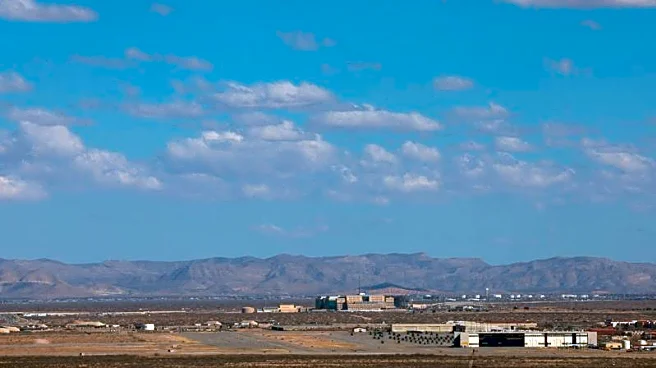What's Happening?
The International Monetary Fund (IMF) has announced a review of Pakistan's fiscal policies and emergency provisions in response to the devastating floods that have claimed 972 lives, according to Pakistan's National Disaster Management Authority. The floods have severely impacted Punjab province, destroying crops, livestock, and homes, and are now threatening Sindh, potentially exacerbating food inflation and economic hardship. The IMF's upcoming Extended Fund Facility review will assess the agility of Pakistan's FY26 budget in addressing the spending needs necessitated by the floods. Pakistan's central bank is expected to maintain its key rate at 11% as policymakers balance inflation risks from crop losses against a slowing economy.
Why It's Important?
The floods in Pakistan highlight the country's vulnerability to climate change, as noted by the Global Climate Risk Index. The IMF's review is crucial for ensuring that Pakistan's fiscal policies are equipped to handle such natural disasters, which have significant implications for food security and economic stability. The destruction of agricultural resources could lead to increased food prices, affecting the population's access to essential goods. The IMF's involvement underscores the importance of international support in bolstering Pakistan's economic resilience against climate-related challenges.
What's Next?
The IMF's review will determine the disbursement of a $1.4 billion loan approved in May to help Pakistan strengthen its economic resilience. Successful completion of the review is necessary for the release of funds. The central bank's decision on interest rates will also play a role in shaping the country's economic response to the floods. Stakeholders, including government officials and international organizations, will likely focus on reconstruction efforts and long-term strategies to mitigate future climate risks.
Beyond the Headlines
The floods in Pakistan may prompt discussions on the ethical responsibility of developed nations to support countries most affected by climate change. The situation could lead to increased advocacy for global climate action and financial aid to vulnerable regions. Additionally, the floods may influence Pakistan's domestic policies on disaster preparedness and environmental sustainability.









